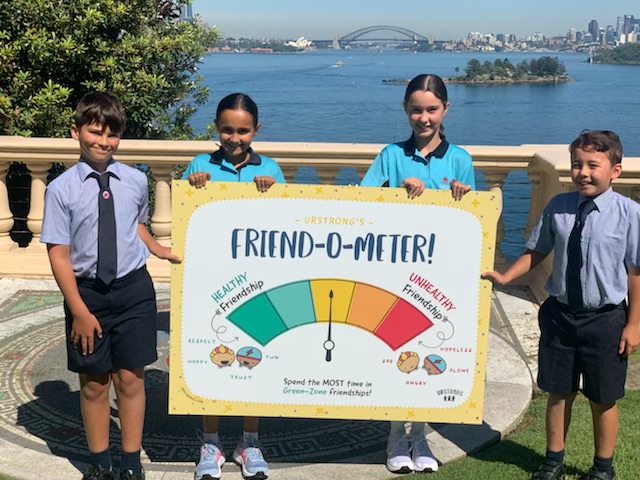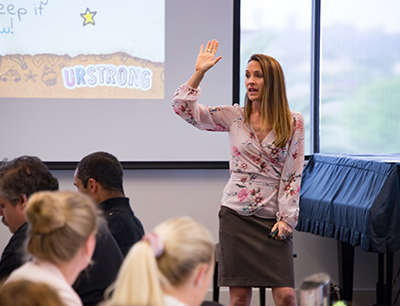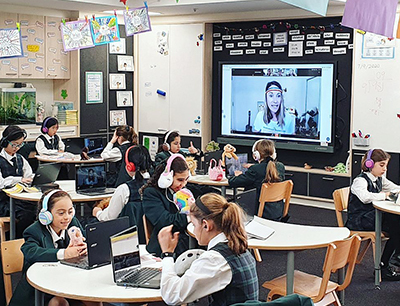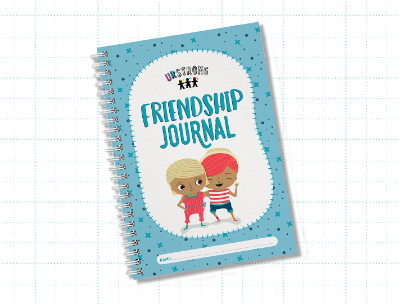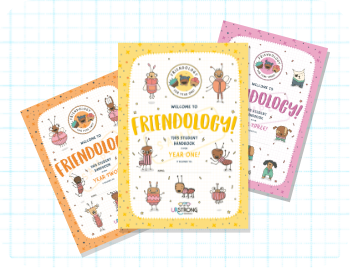FAQs
Have a question?
We may have heard it before.
My Child is Struggling with a Specific Friendship Issue!
First, I’m so glad you’re here! And, I’m guessing you’ve searched our Resource Library to find something that will offer you or your child some support.
If you can’t find anything that addresses your particular friendship challenge, please reach out to Dana (our Founder) directly at dana@urstrong.com. She will either point you in the right direction OR will create a new video or resource for you!
We’ve got your back!
What is the evidence-base for URSTRONG?
Great question! Our URSTRONG Schools can attest to the impact that our program has on a community and we’ve loved hearing so many success stories over the years. In addition to Case Studies that demonstrate the impact at individual schools, here are some resources that speak to the evidence-based foundation of URSTRONG:
- Be You Programs Directory (Assessment by the Murdoch Children’s Research Institute and the University of Melbourne)
- Victoria Department of Education Schools Mental Health Menu (We are an approved, evidence-based provider endorsed by the DET in Victoria)
- Department of Education South Australia: External Progams Wellbeing Directory (We are an approved, evidence-based provider endorsed by the DET in South Australia)
- Catholic Education Western Australia (CEWA Wellbeing Consultants have adopted our whole-school friendship strategy & curriculum in their strategic system-wide approach to enhance wellbeing)
- Maroondah Positive Education Network (Along with a Friendship Ninja Zone in their local shopping centre, we have URSTRONG Schools across Maroondah who also all use our Friendship Journals)
- URSTRONG Impact Report (in collaboration with Simon Fraser University, Canada)
- Friendology Facilitator’s Guide (highlighting some of our research with thousands of schools since we began in 2009)
We also provide URSTRONG Schools with a Pre & Post Assessment tool, developed in collaboration with Simon Fraser University. This allows schools to capture their own data to demonstrate the impact of the program and the improved ‘friendship literacy’ amongst students.
Please reach out if you’d like any more information and we’d be most happy to put you in touch with a URSTRONG School to share their experience!
Can we customise the Friendship Journal?
Yep, you sure can! We’ve even had schools run contests to use student drawings as their cover pages! Plus, you get to choose your own colour! Here are some more details:
- Build the Friendship Journal to reflect your school’s brand: all schools who purchase the Friendship Journal will be able to extensively customise the front and back cover by choosing the colour of the cover and include your logo and school photos.
- Customise content to ensure your school’s critical information is included: we’re providing schools with up to 10 pages of custom content to ensure the Friendship Journal provides students and parents with all the important information they need. Examples of content include important school dates, dress code and behaviour standards, a letter from the Principal, Acknowledgement of Country and more.
Our school already has a branded diary. Can we get the digital files to embed the Friendship Journal in our diaries?
Yes, yes, and yes. We’ve had schools do this and it works really well. It allows your school to maintain their tradition, while bringing our exciting and fun content to your students. This is a win-win for everyone!!
How much does it cost?
Yes, we thought you might ask that! Our current rate is $14 to $19 per copy depending on the number of Friendship Journals ordered. Obviously, the more you order, the cheaper it is! You can request a quote to find out exactly!
Is your school on a tight budget? You’re not alone! We have had some schools get super creative by splitting the cost between the school and parents. And, we’ve also had schools get their Friendship Journals subsidized by corporate sponsors. It’s a great way to engage the community… Learn what the schools in Maroondah, Victoria have done!
What’s the age/grade range for the Friendship Journal?
For 2022, we will have 3 unique Friendship Journals – one for each stage (Years 1&2, Years 3&4, and Years 5&6). The activities all mirror our new Friendology 101 curriculum, bringing the concepts to life in a fun and playful way.
Want in a little secret? For 2023, we are developing a second version for each stage. This means, a child will never have the same Friendship Journal twice!! How cool is that!?!
The other cool thing is that we’ll keep the monthly themes consistent, so that a whole-school approach can still be implemented.
How do your online/virtual workshops work?
I’m so glad you asked! We’ve now done hundreds of online workshops since COVID-19 closed schools down and are pros at this “new way” of teaching. While in-person workshops are still possible in areas we have Licensed Presenters, our online workshops have proven to be just as impactful and, in the case of our parent-child workshops, EVEN BETTER!
For Day of Friendship workshops, we create zoom links for each session. Students can log-in via their individual devices or teachers can log-in and display the session up on their interactive boards or screens.
For our Language of Friendship (parent-child) workshop, parents register online to attend. They are sent the log-in details and simply click on the link when it’s go-time. Parents & children have the option to have their cameras on/off and can use the chat functionality to ask questions. The school is requested to welcome their families at the beginning and introduce our Presenter!
We generally book out months in advance, so submit your request early if you’re interested! We’d love to work with your school!
How do I find a specific resource I’m after?
Head on over to the Resource Centre and use the keyword search. Remember, Friendology 101 is our stand-alone curriculum (8 sessions per stage) and the resources are individual lessons to reinforce key concepts.
Can’t find what you’re looking for? No worries – just send us an email to info@urstrong.com and we’ll go searching.
What if I’m feeling overwhelmed & I don’t know where to begin?
Hey, don’t worry for one second… We know you have a lot on your plate and we want it to feel easy. We’re here to help! Just shoot us an email to info@urstrong.com and we’ll set up a call to help you come up with a plan.
Also, a little tip: Start small. Maybe you just teach Session 1 of Friendology to your class, just to get a feel for it? Maybe you just “push play” on one of the Friendology videos to watch it in action, before even considering your plan? Or maybe you connect with another teacher at a URSTRONG School to find out what they did? The point is – if it feels big, start small.
Do our teachers need to attend training?
No, but it’s highly recommended. In order for them to teach their students to be Friendship Ninjas, they must be Friendship Ninjas themselves!
Our Friendology 101 Educator Training is video-based and included within the Good Friends, Great Friends, and Best Friends memberships. It allows your teachers to learn directly from our Founder, Dana, at any time. In addition to learning how to teach the curriculum and implement a whole-school strategy, they will learn the science of friendship and why social-emotional learning must be prioritized in schools! Many of our URSTRONG Schools have had their entire staff trained in our curriulum, so that they’re all on the same page and working together as a team. Another bonus within the training is seeing pictures and hearing ideas from other URSTRONG Schools around the world!
If your school is ready to be Best Friends, you get two live sessions to bookend your training. You also receive guided support to help you plan the perfect schedule, along with lots of tips and guidance from Tyson, our Director of URSTRONG Schools.
I’ve taught Friendology, now what?
Like all skills, friendship skills take practise and develop over time with consistent reinforcement and teaching. Consider Friendology the foundation – you need to keep building from there, progressing students through those Higher Order Thinking Skills (Blooms Taxonomy).
Our Resource Centre has hundreds of lesson plans and activities that allow you to dig deeper. As a student-centred educator, consider what areas your students need to work on. Are they still having trouble putting out their Friendship Fires? Do they need to work on their Quick Comebacks? Or maybe there’s a very specific issue they’re dealing with, like gossip or unhealthy friendship groups or exclusion? Search our resources by filtering by topic, grade, or use the keyword search.
Our URSTRONG Schools also keep reinforcing the skills all year long through things like assemblies, student leaders (“Friend-o-Leaders”), supervision lanyards, newsletters, & national events like Harmony Day. There are also lots of ways to keep weaving our strategy into your school community, creating an even stronger foundation of friendship.
How do we map out a plan for our school?
First of all, whether it’s a Wellbeing Team or one Head Friendship Ninja, someone needs to take a lead role in guiding & supporting the teachers.
Secondly, we have a number of Supporting Documents to help you devise an implementation plan, from a basic planning tool to a very prescriptive Scope & Sequence that maps out the entire year for you. It’s important to keep in mind that our URSTRONG Schools report it takes about 3-years for your community to become “fluent” in our langauge of friendship.
How do we launch in a fun way?
Between Friendship Ninja Assemblies, teachers acting out common Friendship Fires, or Festivals of Friendship…we’ve heard of so many creative ideas. The idea is that you create an event that is fun, but also educational. Think of it as a chance to introduce the program and get everyone excited!
Often, URSTRONG Schools build their launch around one of our school workshops. This allows a “Friendship Expert” to introduce the language & strategies to the kids, parents, and teachers to kick things off! Learn more about our School Workshops.
Do you offer your curriculum in different languages?
Currently our curriculum and resources are only available in English. However, you are welcome to teach the lessons in any language you want – just noting that the handouts and resources are in English. Hopefully one day we will be able to offer our resources in a range of languages!
Can I attend a workshop that is listed as private?
No, private workshops are only for the members of that specific school community. Please keep your eye out for another public workshop close by to you that you can attend, or consider asking your school to host a Language of Friendship (parent-child) workshop.
I am a Psychologist/Counsellor/Group Leader or run my own program for kids. Can I join the URSTRONG Schools Community & get access to Friendology 101?
Our resources & curriculum are designed only for use in our URSTRONG Schools, taught only by teachers. Therefore, as a private practitioner you are unfortunately not eligible to join the URSTRONG Schools community, deliver Friendology 101, or use any of our IP. Our IP (Intellectual Property) includes the language, strategies, & visual tools and many of our terms have been trademarked for this reason and are protected under copywrite laws. (Sorry! We hope to one day find a model that will allow private practitioners to utlilize our curriculum & resources in an effective way.)
However, there are lots of other ways that you can partner with us at URSTRONG! Maybe you could host a workshop for your community? Maybe you could encourage your parents to take advantage of our free Parent Membership? We can get creative around ways that we can honour the integrity of our schools-based programming, plus support you in your practice/organization. Send us a note and let’s get chatting: info@urstrong.com
What if I’m attending a parent-child workshop and have a younger child who isn’t yet school-aged. Can I bring them along?
Our workshops are only for school-aged children and their parents/caregivers. We are not able to accommodate younger children at our in-school workshops (unless a school specifically states that they are providing childcare for the duration of the workshop). However, for our online workshops, you are more than welcome to have them sit in on the session… We’ve even had beloved pets attend our sessions! (One dog transformed into a Friendship Ninja! Anything is paw-sible!)
For a Language of Friendship (Parent-Child) Workshop do both myself and my child need a ticket?
Yes, every person who attends a workshop needs a ticket (both adults and children). It is also very important that you attend together… This workshop is designed for interactive activities and will strengthen your connection (along with teaching you both lots of tips for forming healthy, feel-good friendships!).
What if there is not a workshop in my area?
If you would like to attend a Language of Friendship (parent-child) workshop and you can’t see a public workshop online, the best thing to do is introduce your child’s school to URSTRONG and invite them to host a workshop!
You can also reach out to us to let us know that you’d like to see something happening at your school and we will support you as you introduce URSTRONG to your school community. We do host public Language of Friendship workshops online a few times throughout the year.
How do I know if URSTRONG aligns with our curriculum guidelines?
It does! Friendology 101 meets learning objectives that are set out in provincial, state, and national health curriculums around the world. The development of interpersonal skills, emotional literacy, and conflict-resolution are central to the URSTRONG programming.
In our Educator Resource Centre, you will find documents that map our curriculum to standards around the world including the Australian Curriculum and a Scope & Sequence document that will help you introduce Friendology 101 to your students. We also clearly list our Student Learning Outcomes within every resource and lesson to make it easy for you to map it against your school’s standards. Our Facilitator’s Guide also details how our curriculum aligns with the CASEL framework and the PERMA (Positive Education) model.
Our school already has a wellbeing program. Can we integrate URSTRONG?
URSTRONG is a school-wide relationship strategy that can complement existing wellbeing programs or serve as the foundation for an emerging social-emotional wellbeing program at your school.
What’s unique about URSTRONG is that everything we do is through the lens of friendship skills. This is because all of the wellbeing science proves that relationships are the heart of wellbeing. Research shows that healthy friendships in childhood and adolescence promote positive mental health improving reslience, self-concept, a sense of purpose, academic performance, and attitudes towards learning (Vitaro F., Boivin M., & Bukowski W.M., 2009). We also know that when children experience unhealthy friendships, conflict in friendships, or social isolation, they often display symptoms of anxiety, depression, and have difficulty learning. In addition, children who are struggling socially are more likely to disengage and avoid school. Ultimately, when we get friendships right in schools, students flourish.
Our Friendology 101 Facilitator’s Guide demonstrates how our curriculum aligns with CASEL’s SEL framework and Positive Education’s PERMA model. We have also built out a number of resources that demonstrate how to align our friendship strategy with other social-emotional frameworks. For example, Zones of Regulation, Character Strengths, and theoretical frameworks focused on neuroscience, such as Dan Seigel’s Flipping Your Lid model of the brain and Ash Buchanan’s Benefit Mindset (an evolution of Growth Mindset). In our Friendology 101 Educator Training, we discuss other programs and resources that have a natural fit with our social-emotional wellbeing approach (e.g. Bucket Filler resources, Kimochis, Leader in Me, PBL, Restorative Practices, Berry Street, etc.).
Be sure to get in touch to learn how schools at different stages of their wellbeing journey have integrated URSTRONG into their wellbeing frameworks.
We want to bring URSTRONG to our school. Where’s the best place to start?
We’ve found that hosting a Language of Friendship (parent-child) workshop is a great way to introduce URSTRONG to your school community for a few reasons:
- These workshops are very popular as they provide a host of kid-friendly concepts and tips for parents to create dialogue with their children around friendship issues.
- We also provide complimentary tickets to all teachers so that they can learn the same language and skills to support the students at school.
- This is also a great no-cost option for schools as they most often provide a venue and promotional support while the parents register and pay for themselves.
Every school has different needs and challenges and most of our introductions have come from dedicated parents, teachers or administrators who have emailed or called to learn about URSTRONG. Please don’t hesitate to reach out to us at info@urstrong.com to start the conversation.
Is URSTRONG an anti-bullying program?
Let’s just say, we are a PRO-FRIENDSHIP program! While we don’t use the word “bullying” in our curriculum (because the word is misused, misunderstood, and results in people labeling a child a “bully” – which is name-calling in our eyes!), we are teaching friendship skills that PREVENT bullying. In fact, we were awarded the Inspiration Award by the Government of Alberta, Canada for our leadership in bullying prevention.
Using kids’ language for kids’ problems is a big part of our success in URSTRONG Schools! Here’s an article that explains the important difference between a Friendship Fire, Mean-on-Purpose, Mean-by-Accident, and Bullying.

